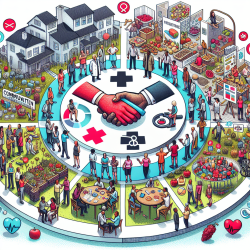Introduction
In today's rapidly evolving world, the mental well-being of adolescents is of paramount importance. A recent study titled "Socioeconomic Inequalities in Mental Well-Being Among Hungarian Adolescents: A Cross-Sectional Study" sheds light on the critical relationship between socioeconomic status (SES) and mental health among adolescents. As practitioners, understanding and implementing these findings can significantly enhance our ability to support young minds in navigating the complexities of adolescence.
Understanding the Research
The study explores how both 'absolute' (education and occupational status of parents) and 'subjective' (self-assessment of family’s social class) measures of SES influence mental health indicators such as shyness, loneliness, need to belong, psychosomatic symptoms, and self-esteem. The findings reveal that adolescents with parents in manual or unemployed occupations are at a higher risk of mental health challenges.
Key Takeaways for Practitioners
For practitioners working in school-based mental health programs, these insights are invaluable. Here are some strategies to consider:
- Targeted Interventions: Develop programs specifically aimed at students from lower SES backgrounds, focusing on building self-esteem and reducing feelings of loneliness and shyness.
- Parental Engagement: Engage parents in workshops that highlight the importance of their role in their children's mental well-being, regardless of their occupational status.
- Holistic Assessments: Incorporate both 'absolute' and 'subjective' SES measures when assessing the mental health needs of students to provide a comprehensive support system.
Encouraging Further Research
The study emphasizes the need for more research to understand the nuances of how SES impacts adolescent mental health. Practitioners are encouraged to collaborate with researchers to explore innovative interventions that can bridge these socioeconomic gaps.
Conclusion
By integrating the findings of this research into practice, we can make a significant difference in the lives of adolescents, empowering them to overcome socioeconomic barriers and thrive. To read the original research paper, please follow this link: Socioeconomic inequalities in mental well-being among Hungarian adolescents: a cross-sectional study.










